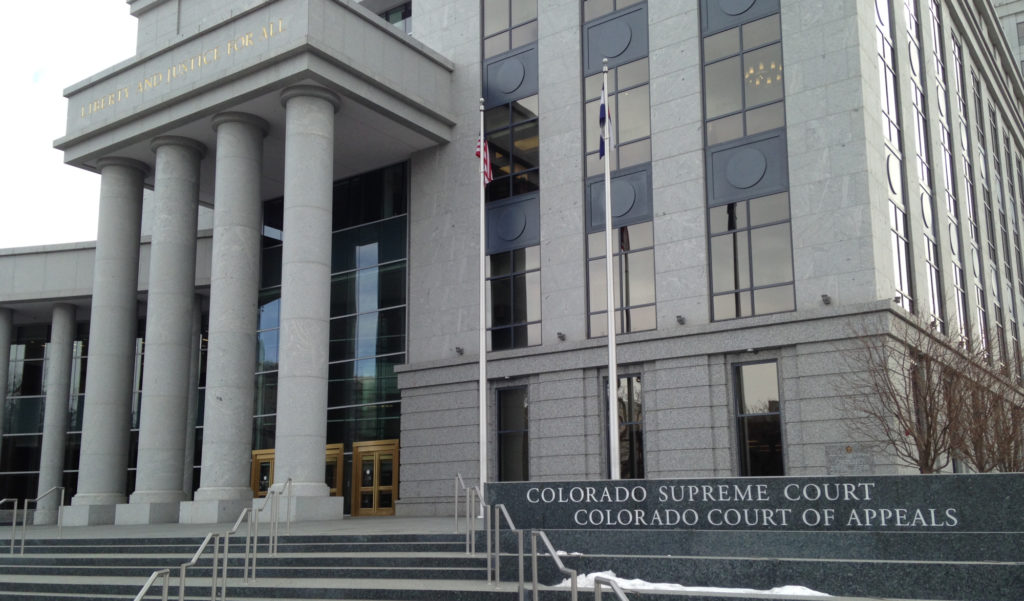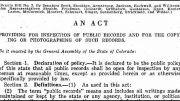By Jeffrey A. Roberts
CFOIC Executive Director
In a precedent-setting ruling, the Colorado Court of Appeals on Thursday determined that Basalt town councilors violated the Colorado Open Meetings Law by convening four executive sessions to discuss legal and personnel matters without telling the public specifically what they would be talking about.
A three-judge appellate panel found that Eagle County District Court Judge Russell Granger “misapplied the statute” in 2017 when he upheld the council’s practice of providing no details prior to the closed-door meetings. The plaintiff, Basalt resident Theodore Guy, is entitled to any recordings and minutes of the executive sessions, the appeals court decided.

“The Court of Appeals’ ruling fully vindicates Mr. Guy’s efforts over the past three and a half years to make his elected officials comply with the open meetings law,” said Colorado Freedom of Information Coalition president Steve Zansberg, a First Amendment attorney who represents Guy with attorneys Katayoun Donnelly and Tom Kelley.
“Mr. Guy is the real hero in this story,” he said. “Today’s published opinion is binding precedent on all the state’s district judges, and it makes clear that local public bodies must provide the public with notice, prior to meeting behind closed doors, identifying ‘the particular matter’ they will be discussing with some degree of detail. This is precisely what the General Assembly has mandated, so that the public is not left in the dark when its government officials discuss public business in private.”
Since 2001, the Colorado Open Meetings Law has required state and local public bodies to announce the topic of each executive session, prior to taking a vote to convene the private meeting, “in as much detail as possible without compromising the purpose for which the executive session is authorized.”
Granger, in his ruling three years ago, called that provision just a “technical” aspect of the Sunshine Law. The phrase, “in as much detail as possible,” is ambiguous, he concluded, because it would always be possible to find a way to further describe a particular matter to be discussed. But the appeals court judges said it was possible, “even reasonably possible,” for the town council to describe at least the subject matter of executive sessions called to get legal advice without waiving the attorney-client privilege.
And, the Court of Appeals determined, the council could have identified then-town manager Mike Scanlon as the subject of an executive session on personnel matters without infringing on Scanlon’s privacy rights. Doing so, an attorney for the town had argued, would have violated the terms of his employment contract.
“The simple answer to this … is that the Town may not, by contract, evade its statutory obligations,” the judges wrote. “The Town’s desire to limit its exposure to a possible legal action by Scanlon did not, in our view, justify negating the public’s right to know the subject of what its officials would be discussing in secret.”
The appeals court also ruled that Guy is entitled to attorney fees in the appellate case, and it remanded the case to the district court to determine the amount. The court, however, did not grant Guy’s request that further proceedings be conducted by a different district court judge. Guy’s attorneys had argued that Granger “repeatedly evinced his disdain for citizens, like Mr. Guy, who invoke the courts’ authority to compel public bodies to adhere to the law.”
“There is, in our view, no indication that the judge harbored any personal bias against Guy or his counsel,” the appellate judges wrote. “Nor did the judge fail to treat Guy’s claims seriously or dispose of them in an arbitrary manner.”
The appellate judges wrote they have no reason to believe that Granger “would have substantial difficulty in casting aside his erroneous, previously expressed views” or in reassigning the case to a different judge if needed “to preserve the appearance of fairness.”
Follow the Colorado Freedom of Information Coalition on Twitter @CoFOIC. Like CFOIC’s Facebook page. Do you appreciate the information and resources provided by CFOIC? Please consider making a tax-deductible donation.




